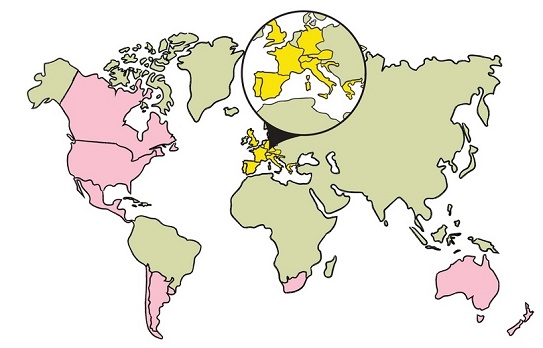Missouri Wine Production
Missouri has a rich and unique history in American wine. In fact, it is one of the oldest wine producing states in the U.S. and was a key player in rescuing European vineyards during the phylloxera crisis in the 19th century.
Today, Missouri is known for its native and hybrid grape varieties, historic wineries, and robust, flavorful wine styles.
1,300 Hectares
(3,200 Acres)
3.3 million Litres
125+ Wineries
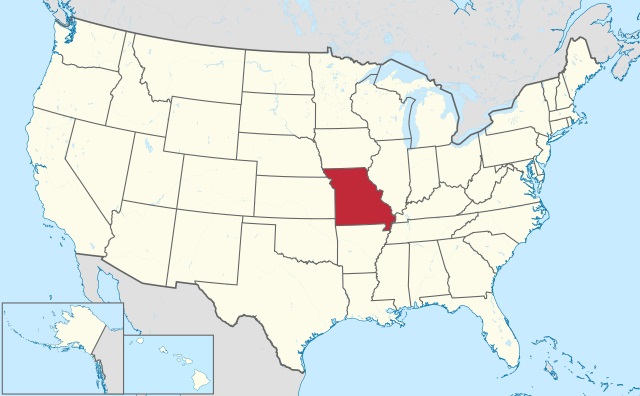
History
German immigrants founded the wine industry in Missouri early in the 19th century, resulting in a wine corridor being called the "Missouri Rhineland".
Later Italian immigrants also entered wine production. In the mid-1880s, more wine was produced by volume in Missouri than in any other state, and before prohibition, Missouri was the second-largest wine-producing state in USA, with more than 1 million gallons (3.785 million liters) annually.
Missouri's grape researcher George Husmann helped replant European vineyards with phylloxera-resistant American rootstock in the 19th century, saving the European wine industry.
Wine Industru Trends
Missouri wines tend to be fruit-forward, bold, and often off-dry or sweet, though lately more and more wineries are producing dry, oak-aged, and sparkling wines.
Norton, the signature red, is often compared to Zinfandel or Syrah in structure and intensity.
Sweet Concord and Catawba wines remain popular among local consumers.
Sparkling wines are gaining attention with hybrids like Vidal Blanc and Chardonel.
Missouri viticulture emphasizes disease-resistant hybrids, reducing the need for chemical sprays in the humid climate.
Missouri Wine Regions
Missouri had the first area recognized as a federally designated American Viticultural Area with the Augusta AVA acknowledged on June 20, 1980. There are now four AVAs in Missouri.
- Augusta (AVA 1980)
- Hermann (AVA 1983)
- Ozark Mountain (AVA 1986)
- Ozark Highlands (AVA 1987)
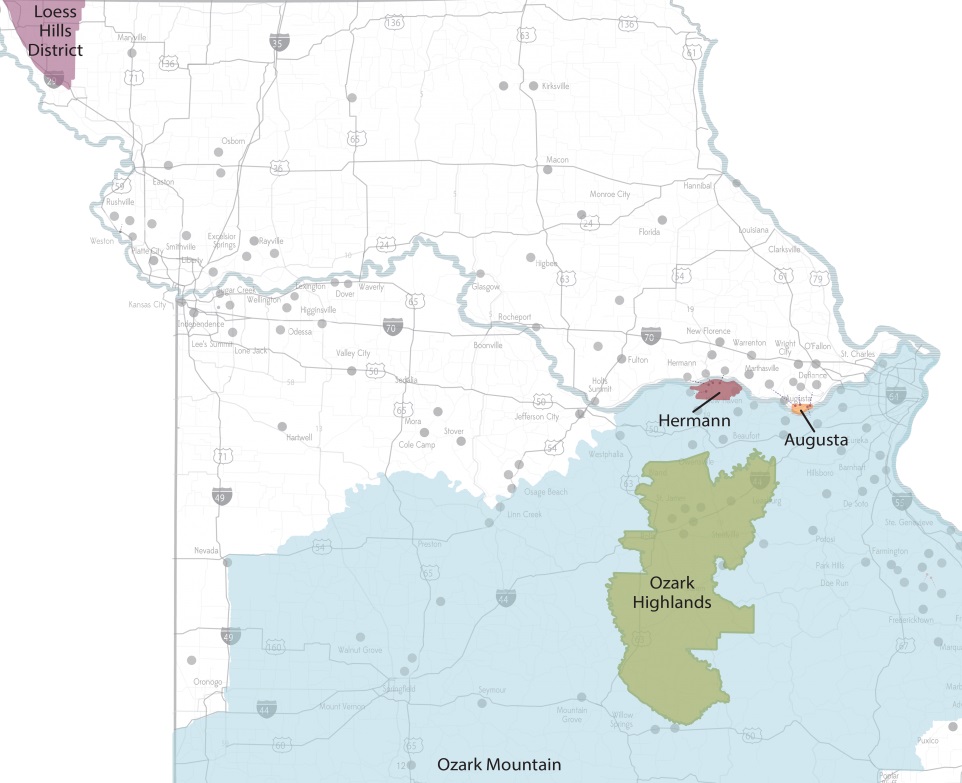
Augusta (AVA 1982)
The first AVA in the USA was given to Augusta in June 1980.
7 California districts had filed applications to the Bureau of Alcohol, Tobacco and Firearms. However, the first AVA was given to 15 square mile area surrounding Augusta.
The bureau cited the unique soil, climate and wines, Augusta’s long history as one of America’s oldest wine districts.
Napa Valley was the second AVA in USA, after Augusta, in January 1981.
- Climate
Humid continental. River influence helps moderate temperatures. - Soil
Loess and clay over limestone. - Grapes
Norton
Chambourcin
Vignoles
Chardonel
Hermann (AVA 1983)
The Hermannwine region is located along the Missouri River west of Augusta, centered around the town of Hermann.
The region was founded by German immigrants in the early 1800s, and is home to some of the state's most iconic wineries like Stone Hill Winery.
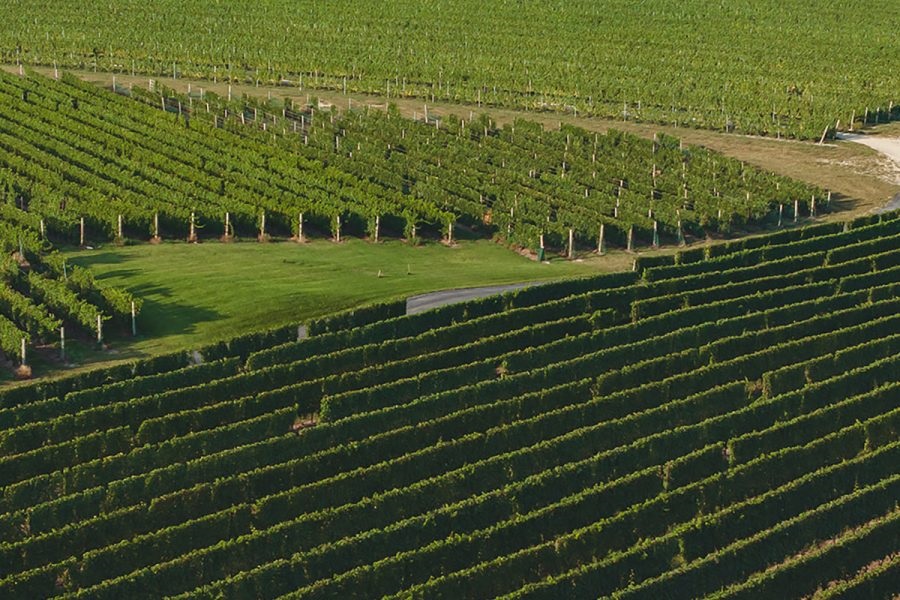
Photo Chateau Grand Traverse
- Climate
Surrounded by Lake Michigan’s Grand Traverse Bay on three sides, this AVA enjoys a near maritime climate. - Soil
Sandy soil with limestone bedrock from old glaciers impart distinctive minerality and acidity to the wines. - Grapes
Norton
Vidal Blanc
Traminette
Catawba
Concord
Ozark Mountain (AVA 1986)
(shared with Arkansas and Oklahoma): A larger regional AVA encompassing Augusta and Hermann.
Ozark Highlands (AVA 1987)
Loess Hills, Mississippi River Hills, and Southwest Missouri: Areas with increasing viticultural interest.
Missouri Grape Varieties
Missouri specializes in native American and French-American hybrid grapes that can withstand humidity, disease pressure, and winter cold.
Red Grapes
| Grape | Description | Area |
|---|---|---|
| Norton | Missouri’s official state grape. Rich, dark, earthy, and age-worthy. One of the most notable native American wine grapes. | 18% |
| Chambourcin | French-American hybrid thrive in colder zones. Producing medium-bodied, fruity reds. | 11.5% |
| Concord | Mostly used for sweet, fruity wines and grape juice. | 6.5% |
| Frontenac | Cold-hardy or hybrid reds used in various styles. | |
| St. Vincent | Cold-hardy or hybrid reds used in various styles. | |
| Baco Noir | Cold-hardy or hybrid reds used in various styles. |
White Grapes
| Grape | Description | Area |
|---|---|---|
| Vignoles | French-American hybrid for used for dry, sweet, and late harvest dessert wines. | 15.5% |
| Chardonel | Chardonnay–Seyval hybrid. Crisp, can be oaked or unoaked. | 7.2% |
| Vidal Blanc | Popular for dry, off-dry, and dessert wines (including ice wine). | 6.0% |
| Catawba | Native grape used for sweet, fruity, or sparkling wines. | 5.5% |
| Traminette | Gewürztraminer hybrid. Aromatic and spicy. | 5.0% |
| Seyval Blanc | Fruity and citrusy hybrid white hybrid grape. | 2.5% |
| Niagara | Native grape used for sweet, fruity, or sparkling wines. |
US Wine Production 2023
California has the dominant role in U.S. wine production, producing more wine (680 millon gallons) than all other states combined.
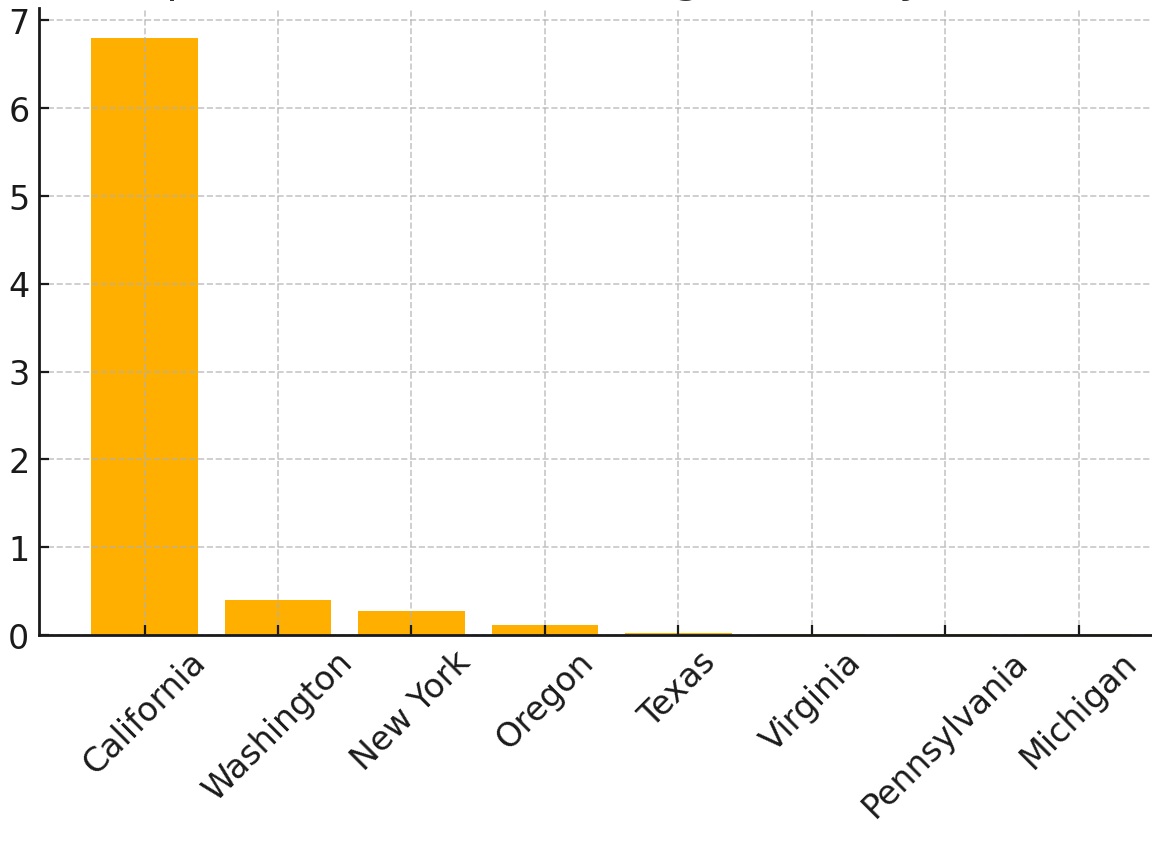
| State | Gallons | Hectares |
|---|---|---|
| 1. California | 680.0 million | 240,000 |
| 2. Washington | 41.0 million | 24,000 |
| 3. New York | 28.0 million | 14,500 |
| 4. Oregon | 12.0 million | 13,000 |
| 5. Texas | 2.1 million | 3,200 |
| 6. Virginia | 1.9 million | 1,800 |
| 7. Pennsylvania | 1.8 million | 1,600 |
| 8. Michigan | 1.5 million | 1,400 |
| 9. Missouri | 1.0 million | 1,300 |
US Grape Plantings
| Grape | Hectares |
|---|---|
| Chardonnay | 36,000 |
| Cabernet Sauvignon | 34,000 |
| Pinot Noir | 22,000 |
| Merlot | 19,000 |
| Zinfandel | 18,000 |
| Syrah | 9,000 |
| Sauvignon Blanc | 8,000 |
| Pinot Grigio | 7,000 |
| Petit Sirah | 4,500 |
| Riesling | 4,000 |
